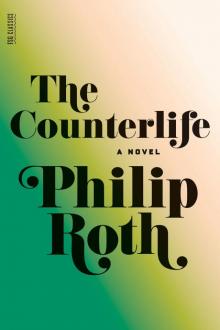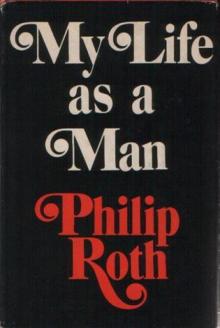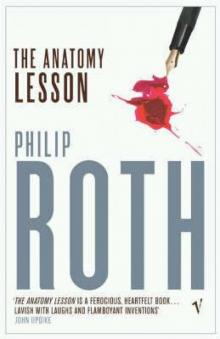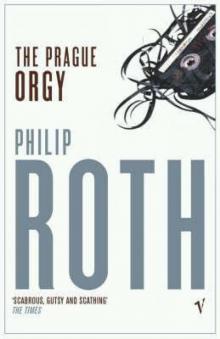- Home
- Philip Roth
Sabbath’s Theater
Sabbath’s Theater Read online
Contents
Cover
About the Author
Also by Philip Roth
Title
Copyright
Dedication
1 There’s Nothing That Keeps Its Promise
Chapter One
Chapter Two
Chapter Three
Chapter Four
Chapter Five
2 To Be Or Not To Be
Chapter Six
Chapter Seven
Chapter Eight
Chapter Nine
SABBATH’S THEATER
In 1997 Philip Roth won the Pulitzer Prize for American Pastoral. In 1998 he received the National Medal of Arts at the White House, and in 2002 he received the highest award of the American Academy of Arts and Letters, the Gold Medal in Fiction, previously awarded to John Dos Passos, William Faulkner, and Saul Bellow, among others. He has twice won the National Book Award and the National Book Critics Circle Award. He has won the PEN/Faulkner Award three times. In 2005 The Plot Against America received the Society of American Historians’ Prize for ‘the outstanding historical novel on an American theme for 2003–2004’.
Recently Roth received PEN’s two most prestigious prizes: in 2006 the PEN/Nabokov Award ‘for a body of work…of enduring originality and consummate craftsmanship’ and in 2007 the PEN/Saul Bellow Award for Achievement in American Fiction, given to a writer whose ‘scale of achievement over a sustained career…places him or her in the highest rank of American literature.’
Roth is the only living American writer to have his work published in a comprehensive, definitive edition by the Library of America. The last of the eight volumes is scheduled for publication in 2013
ALSO BY PHILIP ROTH
Zuckerman Books
The Ghost Writer
Zuckerman Unbound
The Anatomy Lesson
The Prague Orgy
The Counterlife
American Pastoral
I Married a Communist
The Human Stain
Exit Ghost
Roth Books
The Facts • Deception
Patrimony • Operation Shylock
The Plot Against America
Kepesh Books
The Breast
The Professor of Desire
The Dying Animal
Nemeses: Short Novels
Everyman • Indignation
The Humbling • Nemesis
Miscellany
Reading Myself and Others
Shop Talk
Other Books
Goodbye, Columbus • Letting Go
When She Was Good • Portnoy’s Complaint • Our Gang
The Great American Novel • My Life as a Man
PHILIP ROTH
SABBATH’S THEATER
This eBook is copyright material and must not be copied, reproduced, transferred, distributed, leased, licensed or publicly performed or used in any way except as specifically permitted in writing by the publishers, as allowed under the terms and conditions under which it was purchased or as strictly permitted by applicable copyright law. Any unauthorised distribution or use of this text may be a direct infringement of the author's and publisher's rights and those responsible may be liable in law accordingly.
Version 1.0
Epub ISBN 9781407018638
www.randomhouse.co.uk
Published by Vintage 1996
14 16 18 20 19 17 15 13
Copyright © Philip Roth 1995
Philip Roth has asserted his right under the Copyright, Designs and Patents Act, 1988 to be identified as the author of this work
This book is sold subject to the condition that it shall not by way of trade or otherwise, be lent, resold, hired out, or otherwise circulated without the publisher’s prior consent in any form of binding or cover other than that in which it is published and without a similar condition including this condition being imposed on the subsequent purchaser
The author is grateful for permission to quote ‘Meru’ and lines from ‘For Anne Gregory’, from The Poems of W. B. Yeats: A New Edition, edited by Richard J. Finneran. Copyright 1934 by Macmillan Publishing Company, renewed 1962 by Bertha Georgie Yeats. ‘The Sheik of Araby’ by Harry B. Smith, Ted Snyder and Francis Wheeler. All rights reserved. Made in U.S.A. Used by permission of Warner Bros. Publications Inc., Miami, Florida 33014. The quotation on p. 88 is from Western Attitudes Towards Death from the Middle Ages to the Present by Phillipe Ariès, John Hopkins University Press, 1974. The quotation on p. 280 is from ‘A proposal to classify happiness as a psychiatric disorder’, by R. P. Bentall, Journal of Medical Ethics, June 1992.
First published in Great Britain in 1995 by Jonathan Cape
Vintage
Random House, 20 Vauxhall Bridge Road,
London SW1V 2SA
www.vintage-books.co.uk
Addresses for companies within The Random House Group Limited can be found at: www.randomhouse.co.uk/offices.htm
The Random House Group Limited Reg. No. 954009
A CIP catalogue record for this book is available from the British Library
ISBN 9780099582014
FOR TWO FRIENDS
JANET HOBHOUSE
1948–1991
MELVIN TUMIN
1919–1994
PROSPERO:
Every third thought shall be my grave.
— The Tempest, act v, scene 1
EITHER FORSWEAR fucking others or the affair is over.
This was the ultimatum, the maddeningly improbable, wholly unforeseen ultimatum, that the mistress of fifty-two delivered in tears to her lover of sixty-four on the anniversary of an attachment that had persisted with an amazing licentiousness—and that, no less amazingly, had stayed their secret—for thirteen years. But now with hormonal infusions ebbing, with the prostate enlarging, with probably no more than another few years of semi-dependable potency still his—with perhaps not that much more life remaining—here at the approach of the end of everything, he was being charged, on pain of losing her, to turn himself inside out.
She was Drenka Balich, the innkeeper’s popular partner in business and marriage, esteemed for the attention she showered on all her guests, for her warmhearted, mothering tenderness not only with visiting children and the old folks but with the local girls who cleaned the rooms and served the meals, and he was the forgotten puppeteer Mickey Sabbath, a short, heavyset, white-bearded man with unnerving green eyes and painfully arthritic fingers who, had he said yes to Jim Henson some thirty-odd years earlier, before Sesame Street started up, when Henson had taken him to lunch on the Upper East Side and asked him to join his clique of four or five people, could have been inside Big Bird all these years. Instead of Caroll Spinney, it would have been Sabbath who was the fellow inside Big Bird, Sabbath who had got himself a star on the Hollywood Walk of Fame, Sabbath who had been to China with Bob Hope—or so his wife, Roseanna, delighted in reminding him back when she was still drinking herself to death for her two unchallengeable reasons: because of all that had not happened and because of all that had. But as Sabbath wouldn’t have been any happier inside Big Bird than he was inside Roseanna, he was not much bruised by the heckling. In 1989, when Sabbath had been publicly disgraced for the gross sexual harassment of a girl forty years his junior, Roseanna had had to be interned for a month in a psychiatric institution because of the alcoholic breakdown brought on by the humiliation of the scandal.
“One monogamous mate isn’t enough for you?” he asked Drenka. “You like monogamy so much with him you want it with me too? Is there no connection you can see between your husband’s enviable fidelity and the fact that he physically repels you?” Pompously he continued, “We who have never stopped exciting each oth
er impose on each other no vows, no oaths, no restrictions, whereas with him the fucking is sickening even for the two minutes a month he bends you over the dinner table and does it from behind. And why is that? Matija is big, powerful, virile, a head of black hair like a porcupine. His hairs are quills. Every old dame in the county is in love with him, and not just for his Slavic charm. His looks turn them on. Your little waitresses are all nuts about the cleft in his chin. I’ve watched him back in the kitchen when it’s a hundred degrees in August and they’re waiting ten deep on the terrace for tables. I’ve seen him churning out the dinners, grilling those kebabs in his sopping T-shirt. All agleam with grease, he turns me on. Only his wife he repels. Why? The ostentatiously monogamous nature, that is why.”
Drenka dragged herself mournfully beside him, up the steep wooded hillside to the heights where their bathing brook bubbled forth, clear water rippling down a staircase of granite boulders brokenly spiraling between the storm-slanted, silvery-green birches that overhung the banks. During the early months of the affair, on a solitary hiking expedition in search of just such a love nest, she had discovered, within a clump of ancient fir trees not far from the brook, three boulders, each the size and the shade of a small elephant, that enclosed the triangular clearing they would have instead of a home. Because of mud, snow, or drunken hunters out shooting up the woods, the crest of the hill was not accessible in all seasons, but from May through early October, except when it rained, it was here they retreated to renovate their lives. Years back a helicopter had once appeared out of nowhere to hover momentarily a hundred feet overhead while they were naked on the tarpaulin below, but otherwise, though the Grotto, as they’d come to call the hideaway, was fifteen minutes by foot from the only paved road connecting Madamaska Falls to the valley, no human presence had ever threatened their secret encampment.
Drenka was a dark, Italian-looking Croat from the Dalmatian coast, on the short side like Sabbath, a full, firmly made woman at the provocative edge of being just overweight, her shape, at her heaviest, reminiscent of those clay figurines molded circa 2000 B.C., fat little dolls with big breasts and big thighs unearthed all the way from Europe down to Asia Minor and worshiped under a dozen different names as the great mother of the gods. She was pretty in a rather efficient, businesslike way, except for her nose, a surprisingly bridgeless prizefighter’s nose that created a sort of blur at the heart of her face, a nose slightly out of plumb with the full mouth and the large dark eyes, and the telltale sign, as Sabbath came to view it, of everything malleable and indeterminate in her seemingly well-deployed nature. She looked as though she had once been mauled, in earliest childhood damaged by a crushing blow, when in fact she was the daughter of kindly parents, both of them high school teachers religiously devoted to the tyrannical platitudes of Tito’s Communist party. Their only child, she had been abundantly loved by these nice, dreary people.
The blow in the family had been delivered by Drenka. At twenty-two, an assistant bookkeeper with the national railway, she married Matija Bali, a handsome young waiter with aspirations whom she had met when she went for her vacation to the hotel that belonged to the railroad syndicate workers on the island of Bra, just off Split. The two went to Trieste for their honeymoon and never returned home. They ran away not merely to become rich in the West but because Matija’s grandfather had been imprisoned in 1948, when Tito broke with the Soviet Union and the grandfather, a local party bureaucrat, a Communist since 1923 and an idealist about big Mother Russia, had dared to discuss the matter openly. “My both parents,” Drenka had explained to Sabbath, “were convinced Communists and they loved Comrade Tito, who is there with his smile like a smiling monster, and so I figured out early how to love Tito more than any other child in Yugoslavia. We were all Pioneers, little boys and girls who would go out and sing wearing a red scarf. We would sing songs about Tito and how he is this flower, this violet flower, and how all the youth loves him. But with Matija it was different. He was a little boy who loved his grandfather. And somebody told on his grandfather—is that the word? Reported. He was reported. As an enemy of the regime. And the enemies of the regime were all sent to this horrible prison. It was the most horrible time when they were like cattle thrown into the ships. Taken by ships from the mainland to the island. And who survives survives and who doesn’t doesn’t. It was a place where the stone was the only element. All they had to do, they had to work those stones, cut them, without a reason. Many families had someone who went to this Goli Otok that means Naked Island. People report on others for whatever reason—to advance, for hatred, for whatever. There was a big threat always hanging in the air about being proper, and proper is to support the regime. On this island they didn’t feed them, they didn’t give them water even. An island just off the coast, a little bit north of Split—from the coast you can see the island in the distance. His grandfather got hepatitis there and he died just before Matija graduated from high school. Died of cirrhosis. He suffered all those years. The prisoners would send cards home, and they had to claim in the cards that they were reformed. His mother told Matija that her father was not good and that he did not listen to Comrade Tito and that’s why he has to go to prison. Matija was nine. She knew what she was telling him when she was telling that. So at school he would not be provoked to say something else. His grandfather said he would be good and love Drug Tito, so he was only in jail for ten months. But he got hepatitis there. When he came back, Matija’s mother makes a big party. He came back, he was forty kilos. That’s ninety pounds or so. And he was, like Maté, a big man. Totally destroyed physically. There was a guy that told on him and that was that. And this is why Matija wished to run away after we married.”
“And why did you wish to run away?”
“Me? I didn’t care about politics. I was like my parents. During the old Yugoslavia, the king and all that stuff, before Communism, they loved the king. Then Communism came and they loved Communism. I didn’t care, so I said yes, yes to the smiling monster. What I loved was the adventure. America seemed so grand and so glamorous and so enormously different. America! Hollywood! Money! Why did I go? I was a girl. Wherever would be the most fun.”
Drenka shamed her parents by fleeing to this imperialist country, broke their hearts, and they too died, both of cancer, not long after her defection. However, she so loved money and so loved “fun” that she probably had the tender attentions of these convinced Communists to thank for whatever impeded the full, youthful body with the tantalizingly thuggish face from doing with itself something even more capricious than becoming enslaved to capitalism.
The only man she would ever admit to having charged for the night was the puppeteer Sabbath, and over the thirteen years this had occurred only once, when he had presented the offering of Christa, the runaway German au pair working at the gourmet food shop, whom he had scouted and patiently recruited for their joint delectation. “Cash,” Drenka had informed him, though for months now, ever since Sabbath had first come upon Christa hitchhiking into town, Drenka had anticipated the adventure with no less excitement than Sabbath and needed no urging to conspire. “Crisp bills,” she said, prankishly narrowing her eyes but meaning it all the same. “Stiff and new.” Adapting without hesitation to the role she’d so swiftly devised for him, he asked, “How many?” Tartly she answered, “Ten.” “Can’t afford ten.” “Forget it then. Leave me out.” “You’re a hard woman.” “Yes. Hard,” she replied with relish. “I have a sense of my worth.” “It’s taken some doing to arrange this, you know. It’s not been a snap setting this up. Christa may be a wayward child but she still requires a lot of attention. It’s I who ought to be paid by you.” “I don’t want to be treated like a fake whore. I want to be treated like a real whore. A thousand dollars or I stay home.” “You’re asking the impossible.” “Never mind then.” “Five hundred.” “Seven fifty.” “Five hundred. The best I can do.” “Then I must be paid before we get there. I want to walk in with the money in my purse knowing that I�
�ve got a job to do. I want to feel like a real whore.” “I doubt,” suggested Sabbath, “that, to feel like a real whore, money alone will suffice.” “It will for me.” “Lucky you.” “Lucky you,” said Drenka defiantly—“okay, five hundred. But before. I have to have all of it the night before.”
The terms of the deal were negotiated while they manipulated each other manually on the tarpaulin up at the Grotto.
Now, Sabbath had no interest in money. But since arthritis had finished him off as a performing puppeteer at the international festivals, and his Puppet Workshop was no longer welcome in the curriculum of the four-college program because of his unmasking there as a degenerate, he was dependent for support on his wife, with the result that it was not painless for him to peel off five of the two hundred and twenty hundred-dollar bills earned annually by Roseanna at the regional high school and hand them over to a woman whose family-run inn netted $150,000 a year.
He could have told her to fuck off, of course, especially as Drenka would have participated as ardently in the threesome without the money as with, but to agree for a night to act as her john seemed to do as much for him as it did for her to pretend to be his prostitute. Sabbath, moreover had no right not to yield—her licentious abandon owed its full flowering to him. Her systematic efficiency as hostess-manager of the inn—just the sheer pleasure, year after year, of banking all that dough—might long ago have mummified her lower life had not Sabbath suspected from the flatness of the nose, from the roundness of the limbs—from nothing more than that to begin with—that Drenka Balich’s perfectionism on the job was not her only immoderate inclination. It was Sabbath who, a step at a time, the most patient of instructors, had assisted her in becoming estranged from her orderly life and in discovering the indecency to supplement the deficiencies of her regular diet.
Indecency? Who knows? Do as you like, Sabbath said, and she did and liked it and liked telling him about how much she had liked it no less than he liked hearing about it. Husbands, after weekending at the inn with their wives and children, phoned Drenka secretly from their offices to tell her they had to see her. The excavator, the carpenter, the electrician, the painter, all the laborers assisting around the inn invariably maneuvered to eat their lunches close to the office where she did the bookkeeping. Men wherever she went sensed the intangible aura of invitation. Once Sabbath had sanctioned for her the force that wants more and more—a force to whose urging she was never wholly averse even before Sabbath had come along—men began to understand that this shortish, less than startling-looking middle-aged woman corseted by all her smiling courtesy was powered by a carnality much like their own. Inside this woman was someone who thought like a man. And the man she thought like was Sabbath. She was, as she put it, his sidekicker.

 American Pastoral
American Pastoral The plot against America
The plot against America The Human Stain
The Human Stain Nemesis n-4
Nemesis n-4 Sabbath’s Theater
Sabbath’s Theater The Professor of Desire
The Professor of Desire Our Gang
Our Gang The Breast
The Breast Operation Shylock
Operation Shylock The Dying Animal
The Dying Animal Letting Go
Letting Go The Counterlife
The Counterlife Everyman
Everyman Nemesis
Nemesis Exit Ghost
Exit Ghost Portnoy's Complaint
Portnoy's Complaint My Life as a Man
My Life as a Man I Married a Communist
I Married a Communist The Anatomy Lesson
The Anatomy Lesson The Great American Novel
The Great American Novel Shop Talk
Shop Talk The Humbling
The Humbling Zuckerman Unbound
Zuckerman Unbound When She Was Good
When She Was Good The Prague Orgy
The Prague Orgy American Pastoral (Nathan Zuckerman)
American Pastoral (Nathan Zuckerman) Goodbye, Columbus
Goodbye, Columbus Reading Myself and Others
Reading Myself and Others